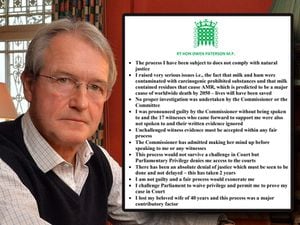Owen Paterson's response in full after being found to have broken lobbying rules
Read Owen Paterson's full statement after the North Shropshire MP was found to have breached Commons rules on lobbying.

The Conservative politician is facing the prospect of a 30-day suspension from Parliament after an investigation found he repeatedly lobbied ministers and officials on behalf of two companies for which he was acting as a paid consultant - Randox, and Lynn's Country Foods.
However the former cabinet minister has angrily rejected the commissioner's findings, releasing a 1,600-word statement in which he described the process as biased and claimed it had contributed to the death of his wife Rose, who died by suicide in June last year.
Read Mr Paterson's statement in full below.
Statement from North Shropshire MP Owen Paterson
The process I have been subject to does not comply with natural justice
I raised very serious issues i.e., the fact that milk and ham were contaminated with carcinogenic prohibited substances and that milk contained residues that cause AMR, which is predicted to be a major cause of worldwide death by 2050 – lives will have been saved
No proper investigation was undertaken by the Commissioner or the Committee
I was pronounced guilty by the Commissioner without being spoken to and the 17 witnesses who came forward to support me were also not spoken to and their written evidence ignored
Unchallenged witness evidence must be accepted within any fair process
The Commissioner has admitted making her mind up before speaking to me or any witnesses
This process would not survive a challenge in Court but Parliamentary Privilege denies me access to the courts
There has been an absolute denial of justice which must be seen to be done and not delayed – this has taken 2 years
I am not guilty and a fair process would exonerate me
I challenge Parliament to waive privilege and permit me to prove my case in Court
I lost my beloved wife of 40 years and this process was a major contributory factor
On 30 October 2019 the Parliamentary Commissioner for Standards wrote to me informing me that she was starting an Inquiry following an article in The Guardian. This raised some questions regarding my publicly disclosed paid consultancies for Randox Laboratories and Lynn’s Country Foods Ltd.
Anyone who has been involved in a workplace investigation knows that the allegations are first put to the accused, usually in a meeting and then the investigation collects the evidence which involves speaking to witnesses.
The Commissioner didn’t speak to me until after she had made up her mind and that is admitted by her. The Commissioner and the Committee didn’t speak to any of the numerous witnesses at any stage.
The allegations were not put to me until AFTER the Commissioner admits she had made up her mind.
This is a biased process and not fair. It offends against the basic standard of procedural fairness that no one should be found guilty until they have had a chance to be heard and to present their evidence including their witnesses.
The Commissioner told me that she conducted an investigative process and she alone would decide what investigations would be undertaken. I was not permitted to know what steps the Commissioner was taking or invited to make suggestions as to who she should speak to.
As I answered the questions put to me, the Inquiry was broadened out, far beyond the original accusations made by The Guardian. As I answered one allegation, another different one was presented. My responses were seemingly ignored.
The Inquiry has been protected by Parliamentary Privilege. I have been forbidden to challenge this unfair process or even discuss it, as the Inquiry must remain confidential until the outcome is published.
I reject completely the findings of the Committee for Parliamentary Standards. The methods of the investigation do not create a just and fair outcome. Most importantly, not one of my 17 witnesses have been interviewed during the course of the investigation despite the passage of 24 months – not by the Commissioner, and not by the Committee. These highly reputable and reliable witnesses are the very people who say I am not guilty. What court, what workplace investigation, would ignore such evidence and call its procedures fair?
The Commissioner’s failure to investigate matters led to some bizarre decisions.
For example, the Commissioner initially found that I didn’t speak to certain key officials who I should have spoken to about contaminated milk. In fact, I not only spoke to them, but I subsequently set up the Milk Quality Forum to help improve milk safety. Some of those officials who I was accused of not meeting attended all our meetings and we had most productive discussions, recommending measures to protect consumers. They gave evidence for me, which was ignored.
I am found guilty of non-declaration of interests when the substantial volume of witness evidence is that I always declare my interests
One of the formal and stated House of Commons requirements of an investigation such as this is that natural justice must be applied. That key requirement was breached, and the conclusions reached by the investigation are thereby unreliable.
I raised serious issues of food contaminated with unlawful carcinogenic substances, to protect the public. I did not gain any benefit, financial or otherwise, either for myself or for either of the two companies that I advise.
Neither has any evidence of gain by those companies been suggested.
My actions are permitted by the rules of the House. I acted properly in raising serious issues of health and officials I engaged with have accepted this.
The MPs’ Code of Conduct says that ‘Members have a general duty to act in the interests of the nation as a whole’. The rules clearly permit all MPs to initiate discussions with ministers and officials to address ‘a serious wrong or substantial injustice’. I was acting in the public interest when I raised these 3 issues of public health:
1. The fact that milk in supermarkets was found to contain an antibiotic residue, Florfenicol, which is prohibited in dairy cows and prohibited from being present in milk because it is a danger to health. Parents would want to know that the milk they were buying for their children could increase the risk and spread of antimicrobial resistance which the World Health Organisation says will be the biggest killer worldwide by 2040. I would not wish to conceal this knowledge from the public or from Government having gained knowledge of it.
2. The fact that a foreign food manufacturer was marketing a ‘natural ham’ that contained a banned carcinogenic nitrite that is recognised as a significant cause of bowel cancer. I would not be fulfilling my duty as an MP if I kept this matter concealed. Full disclosure was in the interests of the public. The company which had been using this banned chemical would also want to know and correct its product. As a result of my intervention the prohibited substance was removed.
3. A priority for UK overseas aid is the improvement of health in developing countries. This objective, and our resources, are undermined by the very poor application of laboratory quality control systems in some countries – to ensure reliable results and diagnoses. As a result of frequent misdiagnoses, lives are lost and valuable healthcare resources wasted. Any MP with this knowledge has a duty to share it for the benefit of the recipients of UK overseas aid and for effective use of significant sums of taxpayers’ money. Here is a serious wrong that the UK can readily address.
The rules are specific that MPs may raise a ‘serious wrong or a substantial injustice’ even if they or their external associates benefit incidentally, but neither Randox nor Lynn’s had any benefit (incidental or otherwise) from my actions to protect the public.
Despite this tortuous and inadequate investigation, I would not hesitate to act in the same way again if confronted with new information about serious harms or wrongs requiring urgent remedy. I would also expect other MPs to do the same as it is no less than the public would demand.
As a result of my interventions, staple foods consumed by millions, milk and ham, are now safer than before. Experts in Overseas Development now know that many of their laboratories abroad are underperforming, failing to protect the health of aid recipients and potentially wasting UK taxpayers’ money.
On a personal level, the cost to me and my three grown-up children from the manner of this investigation has been catastrophic. Last summer, in the midst of the investigation, my wife of 40 years, Rose, took her own life. We will never know definitively what drove her to suicide, but the manner in which this investigation was conducted undoubtedly played a major role.
Rose would ask me despairingly every weekend about the progress of the inquiry, convinced that the investigation would go to any lengths to somehow find me in the wrong. The longer the investigation went on and the more the questions went further and further from the original accusations, the more her anxiety increased. She felt beleaguered as I was bound by confidentiality and could not discuss this Inquiry with anyone else. She became convinced that the investigation would destroy my reputation and force me to resign my North Shropshire seat that I have now served for 24 years. She would also be a casualty, forced to resign her post as Chairman of Aintree Racecourse and a Steward of the Jockey Club, two roles of which she was rightly enormously proud.
I believe that no other MP should ever again be subject to this shockingly inadequate process. As in normal judicial proceedings, MPs subject to investigations must have a chance to see their evidence fully considered. There must be no mystery about interpretations of law that investigations apply. The Committee for Standards has been clear that the Office of the Commissioner is under an obligation to respond to points made by MPs under investigation.
Normal judicial processes, such as the levelling of charges and the interviewing of witnesses, must be followed. If witness evidence is not challenged, it must stand. It is absolutely extraordinary that not one of the 17 witnesses, all of whom supported my narrative, were never contacted let alone spoken to by the Commissioner or the Committee.
Parliament’s internal system of justice needs to operate properly within the principles of natural justice.
In my case, I am very clear that I acted properly and within the rules, putting my lifetime experience, my many years as an MP and my service as a Cabinet Minister towards ensuring the public good.
I am quite clear that I acted properly, honestly and within the Rules.
The Rt Hon Owen Paterson MP





